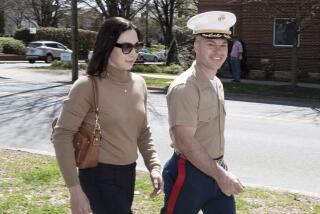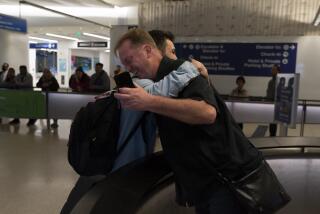Lindh Defense Team Offers Abuse List
WASHINGTON — Claiming John Walker Lindh was a soldier, not a terrorist, his attorneys presented new details Friday of his initial weeks in captivity and said the traumatized young prisoner cooperated with the FBI only in the hope of ending mistreatment by U.S. authorities.
The defense team also released letters written during that period to Lindh by his parents in Northern California, who conveyed their love and eagerness to help him and vented frustration over U.S. officials not forwarding their mail.
The one-way correspondence covers days of uncertainty, and it was not until January that his mother, Marilyn Walker, learned he was still alive.
“You have been in my heart and prayers all these many months of not knowing where you were,” she wrote. “Finding you alive is the answer to all of those prayers.”
Lindh’s arrest in late November sparked outrage in the United States, fueled by video images of a ragged, bearded traitor derided as the American Talib. He eventually was brought to the Washington area and indicted by a federal grand jury as a terrorist whom Atty. Gen. John Ashcroft branded “an active, knowing participant” in the war against America. He will stand trial in August and faces life in prison if convicted.
Now, his San Francisco legal team is working hard to soften his image, and to blame the government for misrepresenting his actions in Central Asia. The court filing Friday was the second in a week in which Lindh’s lawyers have begun to lay out their defense.
Government prosecutors declined to comment on Friday’s discovery motions but are scheduled to respond in court on March 29.
Earlier, the government claimed Lindh, 21, was a terrorist who met Osama bin Laden and was trained at the Al Farouk camp in Afghanistan. But his lawyers insist he was there merely to learn how to be a soldier in the Taliban army and to fight against the Northern Alliance there.
That central difference promises to be the key battleground in the trial--whether Lindh truly sought to harm the United States.
To bolster their view, defense lawyers hope to gain access to statements Lindh made to the FBI after his capture, and to keep them out of the trial on the grounds that he gave them only after harsh treatment by U.S. authorities.
The defense said in court papers Friday that Lindh was “among Taliban troops” who surrendered to the Northern Alliance on Nov. 24 near Mazar-i-Sharif. When some of the captives exploded grenades and attempted to escape, Lindh was wounded by shrapnel and a bullet.
For several hours, according to the defense, he lay wounded on the ground until fellow prisoners carried him to the basement of the Qala-i-Janghi fort.
He remained there for a week. “Mr. Lindh had almost no food, limited water and virtually no sleep,” the defense said.
All the while, U.S. forces fired about 40 missiles at the fort. Northern Alliance soldiers tossed grenades down basement air vents, poured oil or gasoline down the vents and set them on fire, and flooded the basement with freezing water, the defense said. Most of these prisoners died.
When Lindh emerged around Dec. 1, his lawyers said, he was “in a state of complete exhaustion and shock.”
He was taken into U.S. custody and kept for about a week at a location near Mazar-i-Sharif.
“He was surrounded by armed guards and held in a room in which the only window was blocked, making it difficult to discern whether it was night or day,” the lawyers said, adding that he was fed sparingly and given only minimal medical attention.
They said authorities began interrogating him on Dec. 1, after “he was told he would be provided a lawyer sometime later.”
On Dec. 3, San Francisco attorney James J. Brosnahan wrote to top-level officials, including Ashcroft, Secretary of State Colin L. Powell and CIA Director George J. Tenet, saying Lindh’s parents “are most anxious to meet with” their son.
Brosnahan, noting that Lindh appeared to be wounded and hungry, also asked that the interrogation be stopped, “especially if there is any intent to use it in any subsequent legal proceeding.”
On Dec. 4, Brosnahan wrote to the Pentagon, saying that he and Lindh’s parents wanted to visit the prisoner.
He closed: “John is a scholarly and religiously motivated individual, who, at the age of 16, converted to Islam. His religious and scholarly interest in Islam, the Koran and the Arabic language is well established and brought him into his present situation.”
That same day his father, Frank R. Lindh, sent a letter via the Red Cross.
“Mama and I love you very much and are trying to find out where you are being held,” he wrote. “ . . . Please ask the U.S. authorities to allow me, Mama, and the lawyer to come visit you as soon as possible. I hope you’re feeling OK.”
Brosnahan and the family heard nothing back about the young man’s situation. Unknown to them, the interrogation in Afghanistan continued until Dec. 7.
Then Lindh was airlifted to Camp Rhino, near Kandahar, Afghanistan. “During the flight, he was blindfolded and bound with plastic cuffs so tight they cut off the circulation to his hands,” the defense said in the court papers. “Soldiers threatened him with death and torture.”
At the American military base, “Mr. Lindh’s clothes were cut off him, his hands and feet were again shackled, and he was bound tightly with duct tape to a stretcher. Still blindfolded and completely naked, he was then placed in a metal shipping container.”
Lindh had no heat source, lighting or insulation in the container, the defense said. Eventually a blanket was placed under the stretcher, and one atop him. But “he slept little, if at all.”
There he remained until about Dec. 10. Still blindfolded and “in a state of complete exhaustion,” he then was taken to a nearby building or tent, where he was met by an FBI agent.
“When Mr. Lindh asked for a lawyer, he was told there were no lawyers there,” the defense said.
So he talked, because “Mr. Lindh believed that the only way to escape the torture of his current circumstance was to do whatever the FBI agent wanted.”
On Dec. 13, Brosnahan complained in a letter to FBI Director Robert Mueller that he had received no response from any of his other letters to Washington. Lindh’s parents, he said, had received only one “short note” from their son that was dictated to a Red Cross representative on Dec. 3 and arrived in California eight days later.
Lindh was moved to the amphibious assault ship Peleliu in the Arabian Sea the next day.
“Our forces have provided him with appropriate medical attention and will continue to treat him humanely, consistent with the Geneva Convention protections for prisoners of war,” wrote Paul W. Cobb Jr., deputy general counsel for the Department of Defense, in a letter to Brosnahan.
On Dec. 18, Lindh’s father again wrote via the Red Cross. “We did get your message dated December 3--my birthday. You have our unconditional love and complete support. We are begging to see you. Trust in God!”
Nine days after that, he again wrote through the Red Cross. “Mama and I love you much, and hope to see you soon. . . . We hope you are well. God bless you!”
On Jan. 3, Cobb, the Defense official, wrote Brosnahan, telling him a chaplain who had visited the captive “reports that he is doing well physically and is in good spirits.”
The court filings submitted by attorneys for John Walker Lindh can be viewed on The Times’ Web site. Go to https://http://ukobiw.net/lindh.
More to Read
Sign up for Essential California
The most important California stories and recommendations in your inbox every morning.
You may occasionally receive promotional content from the Los Angeles Times.











